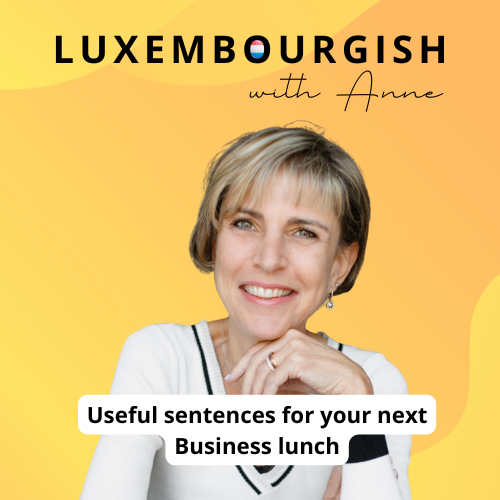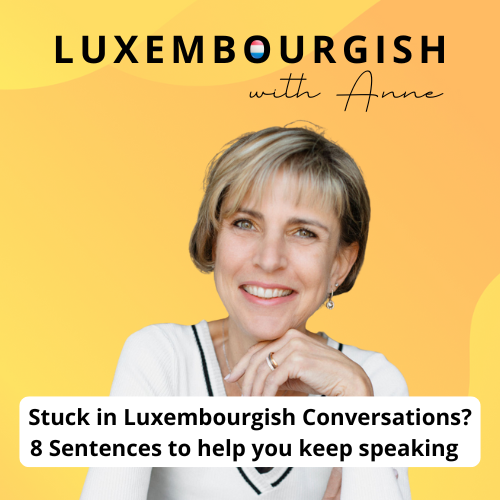Practise your conversation skills with me! I hope that you enjoyed the Conversation Workout #1. In case you missed the last one, you can go back and check it out later up here.
The focus of today’s Luxembourgish conversation workout is on making plans.
So this is an intensive ‘repeat after me’ style lesson. We’re going to practise some really common Luxembourgish phrases that are used when making plans and we’re going to practise saying them together to help you sound casual, much more like a native Luxembourgish speaker when you use them. That’s going to help you to strengthen those speaking skills and your listening skills at the same time.
Making plans is something that we do every day. We make plans for what we’re going to do together in the future, what we’re going to do in the next moment from now. Making plans is also really awesome conversation practice because we propose ideas, we share opinions and then we find a solution that everyone’s happy with.
Now the process of making plans with someone almost always begins with asking a question and in Luxembourgish, the most common, casual and natural way of starting this conversation, especially with friends is simply to ask: Wat wëlls du / wëllt dir maachen?
Watch this week’s lesson here!
Wat wëlls du maachen?
- Wat wëlls du maachen? – What do you want to do?
It’s really common for native speaker (in casual situations) to pronounce maachen like this: man. And so you are more likely to hear:
- Wat wëlls du man? – What do you want to do?
And remember what you’ve learned in workout #1: that in questions we rather use de instead of du. This is really really common in spoken Luxembourgish to use this weak form of du in questions. And thus this questions sounds like this:
- Wat wëlls de man?
And even more natural & casual:
- Wat wëlls de da* man? – What do you want to do?
You’ve noticed that I added dann in this question. Well, in spoken Luxembourgish it is super common to use the word dann (as a modal particle) to make a question sound more casual. You’ll learn all about the different uses of dann in a future lesson on my blog.
*dann is subject to the n-rule.
If you are speaking to several people / friends you’ll say:
- Wat wëllt dir maachen / man? – What do you (plural) want to do?
Listen how I pronounce wëllt dir – you actually don’t hear the final t of wëllt. In spoken Luxembourgish the final t of a verb is usually silent when followed by dir: Listen & repeat: wëlldir – Wat wëllt dir maachen / man?
Alright? Let’s add a time marker to that same question:
- Wat wëlls de den Owend maachen / man? – What do you want to do this evening?
- Wat wëlls de dono maachen / man? – What do you want to do afterwards / later?
- Wat wëllt dir de Weekend maachen / man? – What do you (plural) want to do at the weekend?
Let’s add So (tell me) to the start of this question because it signals that you’re about to talk in a conversation and helps to bring the focus to you. And this is something super casual.
- So, wat wëlls de dono maachen / man? – Tell me, what do you want to do afterwards / later?
Fantastic! Last one now. Let’s add a suggestion to the end of our question:
- So, wat wëlls de dono maachen / man? Solle mer eppes iesse goen? – Tell me, what do you want to do afterwards / later? Shall we go out for a meal?
- Sot, wat wëllt dir dono maachen / man? Solle mer zesummen an d’Stad eppes drénke goen? – Tell me, what do you (plural) want to do afterwards / later? Shall we go together for a drink to the city?
Awesome! Wow you sound so natural now!
When you’re speaking with work colleagues or customers to show that you really want to know what makes them happy you should use the more polite form of asking this same question in Luxembourgish. Let’s go!
Wat wëllt dir gär maachen?
- Wat wëllt dir/Dir gär maachen? – What would you (plural / formal) like to do?
By adding the word gär you sound much more polite. Now let’s add a time marker:
- Wat wëllt dir / Dir gär (e)lo maachen? – What would you (plural / formal) like to do now?
- Wat wëllt dir / Dir gär herno maachen? – What would you (plural / formal) like to do next / later?
Wat hutt dir Loscht ze maachen?
So this is another gentle way of asking someone for their input:
- Wat hutt dir Loscht ze maachen / man? – What do you (plural) feel like doing?
Great!
- Wat hues de Loscht ze maachen / man? – What do you feel like doing now?
Now let’s add again the time marker.
- Wat hutt dir Loscht muer ze maachen / man? – What do you (plural) feel like doing tomorrow?
- Wat hues de Loscht no der Aarbecht ze maachen / man? – What do you feel like doing after work?
Now let’s practise the way that you might answer this question and to do this, we’re going to start with an expression like:
Ech hu Loscht …… / Solle mer …..?
Even though someone asks the question, “Wat wëlls du maachen?” (what do you want to do?), you wouldn’t normally reponse by saying “Ech wëll.” because it sounds a little selfish.
It is better to answer with “Ech hu Loscht …”
All of these also make it a little softer so should we practise a few of these examples?
- Ech hu Loscht italienesch iessen ze goen. – I feel like going for some Italian food.
Now you can also add a pause while you think of what you like.
- Ech hu Loscht ….. japanesch iessen ze goen. – I feel like ….. going for some Japanese food.
Okay now let’s add some emphasis.
- Ech hu richteg Loscht op Nuddelen / Sushi. – I definitely feel like eating pasta / Sushi!
Notice that when you use Loscht hunn op you don’t need to add the verb:
Yes! You got it!
If we want to make a softer suggestion we use the verb “sollen”
- Solle mir an d’Stad eppes drénke goen? – Shall we go to the city for a drink?
Again in questions we rather use the weak form mer instead of mir. This is really really common in spoken Luxembourgish to use this weak form in questions.
- Solle mer bei den Italiener goen? – Shall we go to the Italian restaurant?
Now let’s add on our earlier question just to invite the opinion of the people that you’re making plans with.
- Ech hu Loscht e Film kucken ze goen, mee wat wëlls du gär man? – I feel like watching a movie but what would you like to do?
- Ech hätt Loscht eppes drénken ze goen. An du? – I (would) feel like going for a drink. And you
Notice that I used here hätt instead of hu so to sound more polite and it makes the suggestion softer.
- Also ech hätt Loscht op de Chrëschtmaart ze goen. An dir? – So, I (would) feel like going to the Christmas market. And you (plural)?
Learning Tip
I did not make this lesson for you to watch it once and then walk away and forget about it. This is your training okay? You need to come back and practise with me often, alright?
If you want to sound like a native speaker, you’ve got to get comfortable using these words combination and reductions just like we’ve practised all the way through this lesson.
I’m making more Luxembourgish workouts for you just like this one. So let me know in the comments down below the video what types of conversations you want to practise and I’ll try and make those lessons for you.
Download the PDF so to practice what you have learnt in this lesson!
I hope you liked it and found it useful. And …. why not sharing this lesson with your friends:-)




